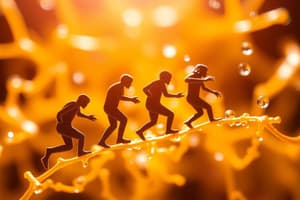Podcast
Questions and Answers
What is the primary focus of zoology?
What is the primary focus of zoology?
- Study of animals (correct)
- Study of ecosystems
- Study of microorganisms
- Study of plants
Which process converts light energy into chemical energy in plants?
Which process converts light energy into chemical energy in plants?
- Cellular respiration
- Photosynthesis (correct)
- Digestion
- Metabolism
Which of the following is NOT a branch of biology?
Which of the following is NOT a branch of biology?
- Psychology (correct)
- Botany
- Ecology
- Microbiology
What is the basic unit of life according to cell theory?
What is the basic unit of life according to cell theory?
Which of these processes focuses on building up molecules?
Which of these processes focuses on building up molecules?
What do genes primarily code for?
What do genes primarily code for?
Which ecological principle describes the flow of energy and nutrients through ecosystems?
Which ecological principle describes the flow of energy and nutrients through ecosystems?
What process converts glucose and oxygen into energy within cells?
What process converts glucose and oxygen into energy within cells?
Flashcards are hidden until you start studying
Study Notes
Overview of Biology
- Definition: The study of living organisms, their structure, function, growth, evolution, and interactions with their environment.
- Branches:
- Zoology: Study of animals.
- Botany: Study of plants.
- Microbiology: Study of microorganisms.
- Ecology: Study of ecosystems and interactions among organisms.
- Genetics: Study of heredity and variation in organisms.
- Molecular Biology: Study of biological processes at the molecular level.
Key Concepts
-
Cell Theory:
- All living things are composed of cells.
- The cell is the basic unit of life.
- All cells arise from pre-existing cells.
-
Homeostasis: The ability of an organism to maintain stable internal conditions despite changes in the external environment.
-
Evolution: The process by which populations change over time through natural selection and genetic drift.
-
Metabolism:
- Anabolism: Building up of molecules.
- Catabolism: Breaking down of molecules for energy.
-
DNA and Genetics:
- DNA (Deoxyribonucleic acid) carries genetic information.
- Genes are segments of DNA that code for proteins.
Classification of Life
- Taxonomy: The science of classifying organisms.
- Domain: Three domains - Archaea, Bacteria, Eukarya.
- Kingdom: Includes Animalia, Plantae, Fungi, and Protista.
Biological Processes
- Photosynthesis: Conversion of light energy into chemical energy in plants.
- Cellular Respiration: Process by which cells convert glucose and oxygen into energy (ATP), carbon dioxide, and water.
Ecological Principles
- Food Chains and Webs: Represent the flow of energy and nutrients through ecosystems.
- Trophic Levels: Levels in the food chain (producers, primary consumers, secondary consumers, etc.).
- Biomes: Large ecological areas with distinct climates and ecosystems (e.g., deserts, forests, tundras).
Importance of Biology
- Medical Advances: Understanding diseases and developing treatments.
- Conservation: Protecting biodiversity and ecosystems.
- Agriculture: Improving crop yields and sustainability through biological research.
Overview of Biology
- Biology explores living organisms, focusing on their structure, function, growth, evolution, and environmental interactions.
- Major branches of biology include:
- Zoology: Examination of animal life.
- Botany: Investigation of plant life.
- Microbiology: Analysis of microorganisms, including bacteria and viruses.
- Ecology: Study of ecosystems and organism interactions.
- Genetics: Exploration of heredity and variations in organisms.
- Molecular Biology: Review of biological functions at the molecular level.
Key Concepts
- Cell Theory underscores that:
- All living organisms consist of cells.
- Cells serve as the fundamental unit of life.
- New cells originate from existing cells.
- Homeostasis refers to an organism's ability to maintain internal stability amid external changes.
- Evolution signifies gradual population changes driven by natural selection and genetic drift.
- Metabolism encompasses two key processes:
- Anabolism: Synthesis of complex molecules from simpler ones.
- Catabolism: Decomposition of molecules for energy production.
- DNA (Deoxyribonucleic acid) is the carrier of genetic information, with genes being DNA segments that instruct protein synthesis.
Classification of Life
- Taxonomy involves the organization of living organisms into categories.
- Three major domains of life include:
- Archaea: Single-celled microorganisms that often thrive in extreme environments.
- Bacteria: Diverse group of single-celled organisms.
- Eukarya: Organisms with complex cells, including animals, plants, fungi, and protists.
- Kingdom classification features four primary kingdoms: Animalia, Plantae, Fungi, and Protista.
Biological Processes
- Photosynthesis is the method by which plants convert light energy into chemical energy, producing glucose and oxygen.
- Cellular Respiration describes how cells manage to convert glucose and oxygen into energy (ATP), alongside carbon dioxide and water as byproducts.
Ecological Principles
- Food Chains and Webs illustrate the flow of energy and nutrients among various species within ecosystems.
- Trophic Levels categorize organisms based on their position in the food chain:
- Producers generate energy through photosynthesis.
- Primary consumers eat producers.
- Secondary consumers feed on primary consumers.
- Biomes represent vast ecological regions characterized by specific climates and ecosystems, such as deserts, forests, and tundras.
Importance of Biology
- Advances in medicine stem from biological research, improving disease understanding and treatment options.
- Conservation efforts focus on protecting biodiversity and preserving ecosystems for future generations.
- Contributions to agriculture enhance crop productivity and promote sustainable farming practices.
Studying That Suits You
Use AI to generate personalized quizzes and flashcards to suit your learning preferences.




